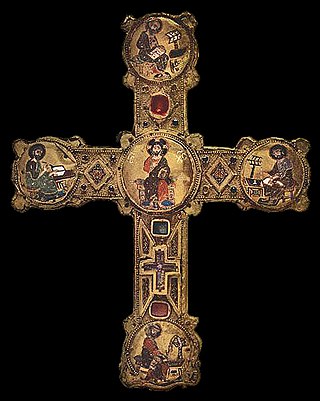Related Research Articles
Carlos is a masculine given name, and is the Maltese, Portuguese and Spanish variant of the English name Charles, from the North Germanic Carl.
Pérez is a very common Castilian Spanish surname of patronymic origin.
Luis is a given name. It is the Spanish form of the originally Germanic name Hludowig or Chlodovech. Other Iberian Romance languages have comparable forms: Luís in Portuguese and Galician, Lluís in Aragonese and Catalan, while Luiz is archaic in Portugal, but common in Brazil.
Rodríguez is a Spanish-language patronymic surname of Visigothic origin and a common surname in Spain and Latin America. Its Portuguese equivalent is Rodrigues.

Cruz is a surname of Iberian origin, first found in Castile, Spain, but later spread throughout the territories of the former Spanish and Portuguese Empires. In Spanish and Portuguese, the word means "cross", either the Christian cross or the figure of transecting lines or ways. For example, in the Philippines, the adopted Tagalog word is rendered to "krus" in plain usage, but the Spanish spelling survives as a surname.
Santos is a Spanish, Portuguese and Galician surname with several variations. The English translation of Santos is Saints. A singular version, Santo, may occur. Origin: Christian, from Latin sanctus.
Torres is a surname in the Catalan, Portuguese, and Spanish languages, meaning "towers".
Hernández is a widespread Spanish patronymic surname that became common around the 15th century. It means son of Hernán, Hernando, or Fernando, the Spanish version of the Germanic Ferdinand. Fernández is also a common variant of the name. Hernandes and Fernandes are their Portuguese equivalents.

Velázquez, also Velazquez, Velásquez or Velasquez, is a surname from Spain. It is a patronymic name, meaning "son of Velasco".
Vásquez is a surname of Galician origin, which later spread all over the Spanish-speaking world. Alternative spellings of the name include Vázquez or Vasques, and Vasquez or Vazquez.
Castillo is a Spanish surname meaning 'castle'. The Portuguese version of this surname is Castilho.

Castro is a Castilian surname popular in Spanish and Portuguese speaking countries, coming from Latin castrum, meaning a castle or fortress. Its English equivalent is Chester.
Nolasco is a surname of Spanish/Portuguese origin. It is derived from the 13th century Catholic saint Peter Nolasco, who died in Barcelona in 1256. In 2014 the surname was most commonly found in Mexico, the Philippines, Brazil and Honduras.

Martínez is a common surname in the Spanish language. Martínez is the most common surname in the Spanish regions of Navarre, La Rioja, Cuenca and Murcia. There are also variations such as San Martin and Martín.

De Jesús, De Jesus or capitalized as de Jesús, de Jesus is a Spanish and Portuguese surname and a common family name in the Hispanic and Portuguese-speaking world. In the year 2000, there were 26,336 people of Hispanic/Latino origin in the United States with the surname De Jesus, making 172nd in order of frequency for all Hispanic/Latino surnames, and 1,002nd most common surname in the U.S. A decade later in 2010, the U.S. Census Bureau surveyed 44,038 people with the last name Dejesus, making it the 783rd most common surname in the U.S. DeJesus is found throughout Latin America, but most prevalent in Brazil with nearly 2,000,000 bearers with second place going to Mexico. In the Philippines, De Jesus is the 33rd most common surname, held by about 1.1% of the population.

Ayala is a toponymic surname, originally de Ayala, deriving from the town of Ayala/Aiara in the province of Álava, in the Basque Country, northern Spain.
Cortés, Cortês (Portuguese), Cortès (Catalan) is a surname of Spanish and Portuguese origin, respectively. The surname derived from the Old French corteis or curteis, meaning 'courteous' or 'polite', and is related to the English Curtis.

López or Lopez is a surname of Spanish origin. It was originally a patronymic, meaning "Son of Lope", Lope itself being a Spanish given name deriving from Latin lupus, meaning "wolf". Its Portuguese and Galician equivalent is Lopes, its Italian equivalent is Lupo, its French equivalent is Loup, its Romanian equivalent is Lupu or Lupescu, its Catalan and Valencian equivalent is Llopis and its basque equivalente is Otxo.
Adalberto is the Romance version of the Latinized form (Albertus) of Germanic Adalbert. It is used in Italian, Portuguese and Spanish. It derives from the Old German Athala and Berth. Notable people with the name include:
References
- ↑ "Rozario Surname Meaning & Rozario Family History at Ancestry.com®". www.ancestry.com. Retrieved 2024-08-21.
- ↑ Olivia Evans (9 December 2024). "Luigi Mangione Arrested at McDonald's: How Police Found Person of Interest in UnitedHealthcare CEO Death". E!News. e!online.